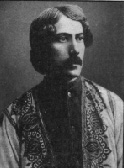Jyotirindranath Tagore
Jyotirindranath Tagore | |
|---|---|
 | |
| Born | 4 May 1849 |
| Died | 4 March 1925 Ranchi, British India |
| Occupation(s) | Playwright, musician, editor and painter |
| Spouse | Kadambari Devi |
Jyotirindranath Tagore (Bengali: জ্যোতিরিন্দ্রনাথ ঠাকুর) (4 May 1849 – 4 March 1925) was a playwright, a musician, an editor and a painter.[1] He played a major role in the flowering of the talents of his younger brother, the first non-European Nobel Prize winner, Rabindranath Tagore.[2]
Works
Historical plays -Purubikram (1874), Sarojini (1875), Ashrumati (Woman in tears, 1879), Swapnamayi (Lady of Dream, 1882).
Satirical plays - Kinchit Jalajog (Some Refreshments, 1873), Eman Karma Ar Korbo Na (I will never do such a thing again 1877), Hathath Nabab (Suddenly a Ruler, 1884), Alik Babu (Strange Man, 1900).
Translations - Kalidas's Abhijñānaśākuntalam (The Recognition of Shakuntala) and Malati Madhava (Malati and Madhava); Sudrak's Mrichhatika (Little Clay Cart); Marcus Aurelius’ Meditations, Shakespeare's Julius Caeser; Bal Gangadhar Tilak’s Gita Rahasya.
References
- ^ Ahmed, Wakil (2012). "Tagore, Jyotirindranath". In Islam, Sirajul; Jamal, Ahmed A. (eds.). Banglapedia: National Encyclopedia of Bangladesh (Second ed.). Asiatic Society of Bangladesh.
- ^ Bandopadhyay, Hiranmay, Thakurbarir Katha, (in Bengali), pp. 106-113, Sishu Sahitya Sansad.
- 1849 births
- 1925 deaths
- Hindu School, Kolkata alumni
- Presidency University, Kolkata alumni
- Bengali writers
- Brahmos
- Writers from Kolkata
- Vangiya Sahitya Parishad
- Translators to Bengali
- People from Ranchi
- Tagore family
- Musicians from Jharkhand
- Dramatists and playwrights from West Bengal
- 20th-century Indian dramatists and playwrights
- 19th-century Indian dramatists and playwrights
- 19th-century male writers
- Indian editorial cartoonists
- Musicians from Kolkata
- Indian male painters
- 19th-century Indian painters
- 20th-century Indian painters
- 20th-century Indian male writers
- 19th-century translators
